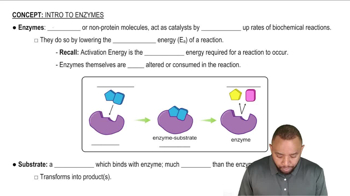Textbook Question
Activation of a zymogen is by covalent modification. How might phosphorylation or dephosphorylation (also covalent modification) modify an enzyme to make it more active (or more inactive)?
29
views
 Verified step by step guidance
Verified step by step guidance



Activation of a zymogen is by covalent modification. How might phosphorylation or dephosphorylation (also covalent modification) modify an enzyme to make it more active (or more inactive)?
Name an enzyme that acts on each molecule.
c. DNA
Name an enzyme that acts on each molecule.
c. RNA
What kind of reaction does each of these enzymes catalyze?
b. A transmethylase
What kind of reaction does each of these enzymes catalyze?
c. A reductase
Alcohol dehydrogenase (ADH) catalyzes the following reaction. To what class of enzymes does ADH belong? <IMAGE>